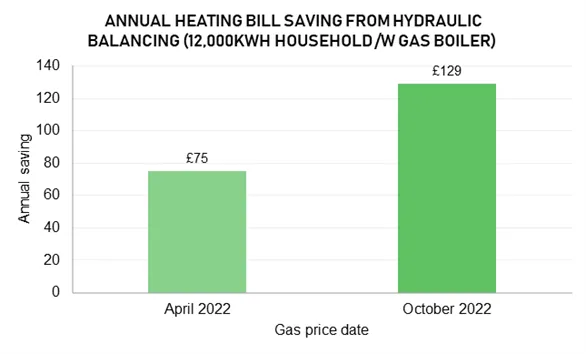The Government recently published its response to a consultation on improving boiler standards and efficiency levels[i]. As the nation aims to ramp up low carbon heating system installations, it’s equally important to ensure today’s dominant boiler systems and their controls achieve higher efficiency standards.
What did the consultation propose?
The improving boiler standards and efficiency consultation set out the Government’s proposals to improve boiler efficiency and enable the installation of high-quality and efficient hybrid heat pumps as we decarbonise the way we heat out homes. The consultation also set out the Government’s position on hydrogen-ready boilers.
The consultation outcome
It’s important to highlight that heating controls can be separated into different classes, as defined by the EU Regulation 811/2013[ii]. Table 1 summarises these different classes:
Table 1 - heating control classes as defined by the EU Regulation 811/2023.
| Class | Control description | For heater type |
| I | On/off Room Thermostat | All heater types |
| II | Weather compensator control | Modulating heaters |
| III | Weather compensator control | On/off output heaters |
| IV | TPI room thermostat | On/off output heaters |
| V | Modulating room thermostat | Modulating heaters |
| VI | Weather compensator and room sensor | Modulating heaters |
| VII | Weather compensator and room sensor | On/off output heaters |
| VIII | Multi-sensor room temperature control | Modulating heaters |
The Government has committed to mandating the use of open protocols for heating controls and combi boilers by 2026, and is considering preventing Class I-III controls from being placed on the market from 2026.
It also potentially plans to expand the scope of open protocols to system and regular boilers in a future Ecodesign consultation. Furthermore, the Government will move to ensure low flow temperatures are the default setting for gas boilers.
What’s been missed?
However, alongside details on what the Government is committing to do to ensure improved standards for the nation’s dominant heating system, the consultation also outlined the decisions it has not made based on stakeholder feedback. Central to this was the decision not to mandate Class VI controls for all gas boilers.
The consultation also proposed to require all domestic gas boilers to be hydrogen-ready by 2026. This has not materialised, with the response instead signalling its desire to mandate this requirement in 2030 if a decision is taken that hydrogen will play a substantive role in heat decarbonisation.
Drayton’s thoughts
Drayton by Schneider Electric was one of 195 organisations that responded to the consultation, sharing our views on the proposed changes to boiler standards. We support plans to improve boiler standards and efficiency and we work to help consumers make the most of their heating controls. However, we were keen to make clear the dangers of mandating Class VI controls in gas boilers.
We believe that mandating these controls will:
- Minimise consumer choice
- Mandate potentially overpriced controls supplied by boiler manufacturers
- Result in additional installation costs
- Result in unnecessary wastage due to early scrappage of obsolete technology
Research from Salford University has also found that the highest energy savings are achieved with Class V controls, therefore removing any significant benefits of installing Class VI controls[iii]. We are supportive of the more pragmatic approach taken by the Government to increase competition and choice, allowing Class VIII controls as an alternative route to compliance while preventing less efficient Class I-III controls from being placed on the market.
We also supported plans for all boilers and controls to use open protocols and welcome the decision taken by the Government to recommend the use of Thermostatic Radiator Valves (TRVs) and auto balancing. It was initially believed that the transition to open protocols would come naturally. However, with around 45% of the UK boiler market still using closed protocols, there is a clear need for legislation to drive this change.
Mandating open protocols on boilers will enable systems to communicate with a diverse range of control systems, increasing consumer choice and subsequently driving down costs across the industry. Recommending TRVs and auto balancing will provide the consumer with greater control over their heating system, and more opportunities for smart thermostats to deliver energy savings.
We also support hybrid heat pump systems on the proviso that valid, impartial advice is provided to the consumer where these systems would be most beneficial.
How will this affect installers?
We understand that installers will be affected by proposals to mandate low temperature heating system training for all gas boiler installers, and mandating that all servicing activity includes water tests and system filter checks. Drayton believes that these changes will ensure systems are installed and maintained at optimum performance levels, with resulting energy savings in situations where boiler manufacturers recommend unnecessarily high flow temperatures in their manuals. Additionally, Drayton has highlighted the benefits of hydraulic balancing, which saves consumers £129 per annum on average, as seen in Figure 1.

Figure 1 - Annual heating bill saving from hydraulic balancing.
To reduce the burden placed on installers, Drayton’s consultation response proposed that these additional training requirements should be embedded within installer’s scheduled ACS re-certification, avoiding disruption to their business cycles. Alongside the consultation response, it was announced that a further consultation on Ecodesign and energy labelling legislation will be released to set the wheels in motion for implementing these new standards and efficiency requirements. This is a further opportunity for us to reiterate our recommendations for increased heating system efficiency, and we look forward to helping to deliver stronger standards for the heating industry.
[i] https://www.gov.uk/government/consultations/improving-boiler-standards-and-efficiency
[ii] https://www.legislation.gov.uk/eur/2013/811
[iii] https://www.beama.org.uk/resourceLibrary/salford-tests-on-load-and-weather-compensation-.html
Related Reading
Drayton stockists near you
Are you an installer?
Check out Drayton Rewards+, our new and improved loyalty scheme that gives you more. Sign up free now to start earning points and access free training!
Sign up today

